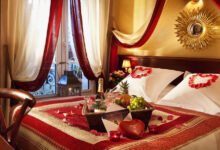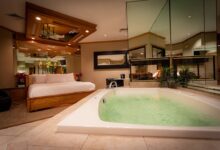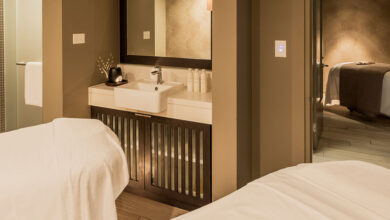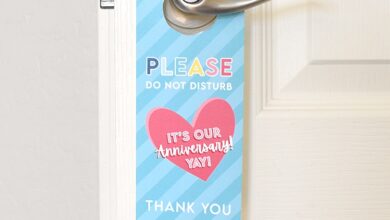Business Hotels A Comprehensive Guide
Business Hotels cater to the unique needs of the traveling professional. From the sleek minimalist designs to the high-speed internet and efficient service, these hotels prioritize productivity and comfort. This guide delves into the world of business hotels, exploring their target audience, ideal locations, essential amenities, and the innovative strategies that keep them at the forefront of the hospitality industry.
We’ll examine everything from pricing models to sustainable practices, offering a comprehensive overview of this dynamic sector.
We’ll uncover the key differences between business and leisure hotels, examining the specific demands of corporate travelers, from solo entrepreneurs to large corporate groups. We’ll also explore the crucial role of technology in enhancing the business traveler’s experience and the increasing importance of sustainability within the industry. By the end, you’ll have a much clearer understanding of what makes a successful business hotel.
Defining Business Hotels
Business hotels cater specifically to the needs of corporate travelers and those on business trips. Unlike leisure hotels that prioritize relaxation and recreation, business hotels emphasize efficiency, productivity, and a professional atmosphere. This focus shapes their design, amenities, and services, creating an environment optimized for work and business interactions.Business hotels prioritize functionality and convenience over lavish aesthetics. They often feature a more streamlined and minimalist design compared to leisure hotels.
This isn’t to say they lack comfort; rather, comfort is provided in a way that supports productivity. For instance, spacious work desks, ergonomic chairs, and reliable high-speed internet access are considered essential.
Key Characteristics of Business Hotels
Business hotels are distinguished by a combination of features designed to meet the practical requirements of business travelers. These features go beyond simply providing a bed and a shower; they aim to facilitate a seamless and productive work experience during a stay.
- Location: Often situated near business districts, convention centers, or airports for easy access to meetings and transportation.
- Meeting and Event Spaces: These hotels typically offer a range of meeting rooms, conference facilities, and event spaces, often with advanced technological equipment.
- Business-Oriented Amenities: These include well-equipped business centers with computers, printers, and copying services; high-speed internet access throughout the hotel; and comfortable workspaces in guest rooms.
- On-Site Services: Business hotels often provide convenient services like laundry and dry cleaning, catering, and concierge services that can assist with business-related tasks.
Amenities and Services in Business Hotels
The amenities and services provided by business hotels are tailored to the demands of the business traveler. These services are designed to enhance productivity, convenience, and overall efficiency during a business trip.
- High-speed internet access: Reliable and fast internet is crucial for communication and work. Many business hotels offer complimentary Wi-Fi with high bandwidth capabilities.
- Business centers: These centers typically provide computers, printers, scanners, and other office equipment for guest use. Staff may also be available to provide technical assistance.
- Meeting rooms: Hotels offer various sizes of meeting rooms, often equipped with projectors, screens, and audio-visual equipment.
- Fitness centers: Many business hotels feature state-of-the-art fitness centers to allow guests to maintain their fitness routines while traveling.
- Restaurant and bar options: Convenient on-site dining options are crucial, often including business-friendly options like quick lunches or informal meeting spaces.
Comparison of Business and Leisure Hotels
Business and leisure hotels differ significantly in their target audiences and the services they offer. While both provide accommodation, their priorities and the experience they offer are distinctly different.
| Feature | Business Hotel | Leisure Hotel |
|---|---|---|
| Target Audience | Business travelers, corporate groups | Families, couples, individual leisure travelers |
| Location | Near business districts, airports | Tourist areas, beaches, scenic locations |
| Amenities | Business center, meeting rooms, high-speed internet | Pools, spas, recreational activities |
| Atmosphere | Functional, efficient, professional | Relaxing, comfortable, entertaining |
| Pricing | Often higher due to amenities and location | Varies greatly depending on location and amenities |
Target Audience of Business Hotels
Business hotels cater to a specific clientele: individuals and groups traveling for professional purposes. Understanding their needs is crucial for these hotels to thrive. Their target audience is diverse, encompassing various professions, travel styles, and budgetary considerations. Success hinges on catering to these varied requirements effectively.The primary demographic groups frequenting business hotels are professionals across a wide spectrum of industries.
This includes corporate executives, consultants, salespeople, government officials, and individuals attending conferences or industry events. These travelers often prioritize convenience, efficiency, and a professional atmosphere during their stays. Their choices are significantly influenced by factors beyond just price, encompassing aspects like location, amenities, and the overall business-friendly environment.
Needs and Preferences of Business Travelers
Business travelers prioritize different aspects of their hotel experience compared to leisure travelers. Factors such as proximity to business districts, reliable Wi-Fi, efficient check-in/check-out processes, and well-equipped business centers are paramount. Many also value comfortable workspaces within their rooms, access to meeting rooms, and readily available printing and copying services. Furthermore, the availability of healthy food options and fitness facilities are increasingly important for maintaining productivity and well-being during travel.
For example, a sales representative meeting clients in a new city would prioritize a hotel near their meeting location with reliable internet for sending reports. An executive attending a conference might require a hotel with ample meeting spaces and high-speed internet for presentations.
Types of Business Travelers and Their Requirements
Business travelers can be broadly categorized into solo travelers and corporate groups, each with unique needs. Solo business travelers often value quiet, efficient service, and a comfortable workspace. They might prefer a smaller, more intimate hotel experience compared to larger, bustling establishments. In contrast, corporate groups often require larger accommodations, including meeting rooms, group dining options, and potentially negotiated rates.
A solo consultant might prioritize a room with a comfortable desk and ergonomic chair, while a large sales team might require a block of rooms near their client meetings with dedicated event spaces for team gatherings. The hotel’s ability to cater to both these distinct needs, offering options ranging from personalized service to comprehensive group packages, is vital for success.
Location and Accessibility of Business Hotels
The success of a business hotel hinges significantly on its location and accessibility. Business travelers prioritize convenience and efficiency, so a strategic location is paramount to attracting and retaining guests. Factors such as proximity to business districts, transportation hubs, and amenities greatly influence a hotel’s appeal and profitability.Choosing the right location requires a careful analysis of the target market and the competitive landscape.
A hotel situated near a major airport or train station will appeal to a wider range of travelers, while a location within a central business district might be more attractive to those attending conferences or meetings in that specific area. The interplay of these factors needs careful consideration to maximize occupancy rates and revenue.
Ideal Locations for Business Hotels
Ideally, business hotels should be located within easy reach of key business districts, offering convenient access to corporate offices, conference centers, and other relevant business facilities. Proximity to major transportation hubs, such as airports, train stations, and subway lines, is equally crucial. This ensures easy and efficient travel for guests arriving from various locations. Furthermore, a location with good access to amenities like restaurants, shopping centers, and entertainment venues enhances the overall guest experience.
The presence of reliable and readily available transportation options, including taxis, ride-sharing services, and public transportation, is also essential for guest convenience.
Location Advantages and Disadvantages
| Location | Advantages | Disadvantages | Example |
|---|---|---|---|
| Central Business District (CBD) | High demand, close to business activities, easy access to amenities. | High land costs, potential noise and congestion, limited parking. | The Peninsula Hotel, New York City (located in Midtown Manhattan, close to major businesses and attractions) |
| Near Airport | Convenient for international travelers, high occupancy during peak travel times. | May lack proximity to business districts, potentially less appealing for shorter business trips. | The Hyatt Regency Chicago (O’Hare) (offers direct access to O’Hare International Airport) |
| Near a Transportation Hub (Train Station) | Excellent connectivity to various parts of the city and surrounding areas, caters to both domestic and international travelers. | Potential noise pollution, might require additional travel to business districts. | Grand Central Terminal area hotels in New York City (offer convenient access to Grand Central Terminal and various subway lines) |
| Suburban Location with Shuttle Service | Lower land costs, potentially quieter environment, offers more space for amenities. | Requires reliable shuttle service, may be less convenient for some guests. | Many hotels near major Silicon Valley tech companies (offer shuttle services to and from company campuses) |
Examples of Successful Business Hotel Locations
The success of a business hotel location often stems from a combination of factors. For instance, the Four Seasons Hotel in downtown Toronto benefits from its proximity to the city’s financial district, major transportation links, and high-end shopping and dining options. This combination attracts both business travelers and tourists, contributing to consistently high occupancy rates. Similarly, hotels near major convention centers, such as those found near McCormick Place in Chicago, benefit from high demand during large conferences and events.
These hotels often offer specialized meeting and event facilities to cater to the needs of corporate clients. The strategic location and the provision of necessary amenities and services create a synergistic effect, boosting the hotel’s overall success.
Amenities and Services Offered by Business Hotels
Business hotels cater to a specific clientele – professionals traveling for work. Therefore, the amenities and services offered go beyond the typical leisure hotel experience, focusing on productivity, comfort, and efficiency. The right mix of offerings can significantly impact a business traveler’s satisfaction and loyalty.
Business travelers expect a seamless and productive stay. This necessitates a range of amenities designed to facilitate their work and minimize disruptions. The specific offerings, however, vary depending on the hotel’s price point and target market.
Essential Amenities and Services for Business Travelers
The following amenities are typically considered essential by business travelers, contributing significantly to a positive stay. The absence of these can lead to dissatisfaction and a negative perception of the hotel.
- High-speed, reliable Wi-Fi: Essential for communication and work.
- Ergonomic workspaces: Comfortable desks and chairs are crucial for extended work periods.
- Business center: Access to printers, scanners, and other office equipment is highly valued.
- Meeting rooms: Availability of various sized meeting rooms for both small and large groups.
- 24-hour front desk service: Ensures assistance is readily available at any time.
- Fitness center: Provides a convenient space for exercise and maintaining a healthy routine.
- On-site restaurant or room service: Offers convenient dining options without leaving the hotel.
- Laundry services: Convenient for travelers staying for extended periods.
Amenities Comparison Across Price Ranges
The range of amenities offered typically correlates with the price range of the business hotel. Budget hotels provide the essentials, while luxury hotels offer a significantly enhanced experience.
| Amenity | Budget Hotel | Mid-Range Hotel | Luxury Hotel |
|---|---|---|---|
| Wi-Fi | Basic, potentially limited speed | High-speed, reliable Wi-Fi | High-speed, reliable Wi-Fi, potentially with dedicated bandwidth for business use |
| Workspaces | Small desk, basic chair | Ergonomic desk and chair, good lighting | Spacious, well-equipped workspace with ergonomic chair, multiple power outlets, excellent lighting |
| Business Center | Basic printer/copier | Printer, copier, scanner, potentially computer access | Fully equipped business center with high-end printers, scanners, computers, and meeting rooms |
| Meeting Rooms | Limited availability, basic equipment | Various sizes available, basic AV equipment | Multiple, state-of-the-art meeting rooms with advanced AV technology, catering services |
Innovative Amenities Enhancing the Business Traveler Experience
Beyond the standard amenities, many hotels are now incorporating innovative services to improve the business traveler’s experience and enhance productivity. These services often focus on personalization, technology integration, and wellness.
- Smart room technology: Voice-activated controls for lighting, temperature, and entertainment systems allow for personalized comfort and efficiency.
- Mobile check-in/check-out: Streamlines the arrival and departure process, saving valuable time.
- Virtual assistants: Provide on-demand assistance with various tasks, from booking transportation to making restaurant reservations.
- Wellness programs: Offer yoga classes, meditation sessions, or access to healthy food options to promote well-being during travel.
- Dedicated co-working spaces: Provide a collaborative environment for business travelers to network and work together.
Marketing and Branding of Business Hotels
Marketing a business hotel effectively requires a nuanced understanding of the business traveler’s needs and preferences. Success hinges on crafting a compelling brand identity and employing targeted strategies across multiple channels to reach this specific demographic. This involves more than just advertising; it’s about building a reputation for reliability, efficiency, and a seamless experience.Effective marketing strategies for attracting business travelers focus on highlighting the aspects most valued by this demographic: convenience, productivity, and comfort.
This means showcasing features that cater directly to their professional needs.
Effective Marketing Strategies for Business Travelers
A multi-pronged approach is crucial. Digital marketing, including targeted online advertising on platforms frequented by business travelers (like LinkedIn and professional industry websites), is essential. Search engine optimization () ensures the hotel’s website ranks highly in search results for relevant s. Email marketing campaigns can nurture leads and promote special offers tailored to corporate clients and frequent business travelers.
Furthermore, partnerships with corporations and travel agencies provide access to a ready-made audience. Content marketing, such as blog posts and articles on business travel tips or local area guides, can establish the hotel as a valuable resource and enhance its brand image. Finally, participating in industry events and trade shows offers direct engagement with potential clients.
Examples of Successful Branding Campaigns for Business Hotels
Many hotels have successfully branded themselves around specific aspects that resonate with business travelers. For example, a hotel might focus on its “productivity-centric” brand, emphasizing high-speed internet, ergonomic workspaces, and business centers with advanced technology. Another might build its brand around “seamless travel,” highlighting convenient airport transfers, efficient check-in/check-out processes, and a loyalty program that rewards frequent guests.
A third might choose to build its brand around “local experience,” showcasing its proximity to business districts and offering curated experiences that highlight local culture and cuisine. The key is to identify a unique selling proposition (USP) and consistently communicate that message across all marketing materials.
The Role of Online Reviews and Reputation Management
Online reviews are incredibly influential in the decision-making process of business travelers. Sites like TripAdvisor, Google Reviews, and Booking.com are frequently consulted before booking a hotel. Positive reviews build trust and credibility, while negative reviews can severely damage a hotel’s reputation. Effective reputation management involves actively monitoring online reviews, responding promptly to both positive and negative feedback, and addressing concerns professionally and efficiently.
This proactive approach not only mitigates the impact of negative reviews but also demonstrates a commitment to customer satisfaction, further enhancing the hotel’s brand image and attracting future business.
Pricing and Revenue Management in Business Hotels
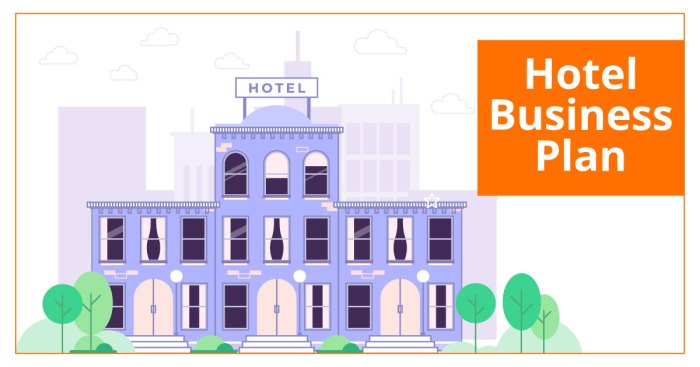
Source: lendingkart.com
Pricing strategies for business hotels are crucial for maximizing profitability while maintaining competitiveness. These strategies must consider factors like location, target market, amenities offered, and the overall economic climate. Revenue management involves dynamically adjusting prices based on real-time demand and other market indicators to optimize occupancy and revenue.Effective pricing requires a nuanced understanding of market dynamics. Hotels analyze data on historical occupancy rates, average daily rates (ADR), and revenue per available room (RevPAR) to inform their pricing decisions.
They also consider external factors such as local events, competitor pricing, and seasonal changes in demand.
Pricing Strategies for Business Hotels
Business hotels employ a variety of pricing strategies to attract different segments of the market and maximize revenue. These strategies are often implemented using sophisticated revenue management software. Common approaches include:
- Rack Rate Pricing: This is the standard price listed for a room, often the highest price available. It serves as a benchmark for other pricing strategies. Hotels rarely rely solely on rack rates, especially during periods of low demand.
- Discount Pricing: This involves offering lower prices to attract more guests, often through corporate agreements, online travel agencies (OTAs), or loyalty programs. Discounts are carefully calibrated to avoid sacrificing profitability.
- Dynamic Pricing: This approach involves adjusting prices in real-time based on factors like demand, day of the week, and competitor pricing. This requires sophisticated algorithms and data analysis to optimize revenue.
- Package Pricing: This strategy combines accommodation with other services, such as meals, airport transfers, or meeting room access, at a bundled price. This can increase the perceived value and encourage bookings.
- Segmented Pricing: This involves offering different prices to different market segments, such as business travelers, leisure travelers, or groups. This allows hotels to maximize revenue by charging what each segment is willing to pay.
Seasonal Fluctuations and Demand
Seasonal fluctuations significantly impact pricing in business hotels. Periods of high demand, such as peak business seasons or major industry conferences, allow for higher prices. Conversely, during slower periods, hotels often implement discounts or promotions to stimulate bookings. For example, a hotel in a major city might see higher demand during weekdays when business travel is prevalent, allowing them to charge premium rates, while weekend rates may be lower to attract leisure travelers.
Conversely, a resort town hotel might see higher demand during summer vacation months. Hotels use historical data to predict these fluctuations and adjust their pricing accordingly.
Pricing Strategies of Budget-Friendly and Luxury Business Hotels
Budget-friendly and luxury business hotels employ different pricing strategies, reflecting their target markets and service offerings.
| Feature | Budget-Friendly Business Hotels | Luxury Business Hotels |
|---|---|---|
| Pricing Strategy | Focus on competitive pricing, discounts, and packages to attract price-sensitive travelers. | Emphasize premium pricing, reflecting the high-quality amenities and services offered. May offer exclusive packages for high-value clients. |
| Revenue Management | Primarily relies on volume and occupancy to generate revenue. | Prioritizes maximizing ADR and RevPAR, even if it means lower occupancy. |
| Seasonal Adjustments | More significant price fluctuations based on seasonal demand. | Less dramatic seasonal price changes due to a more stable, high-spending clientele. |
Technology and Innovation in Business Hotels
The hospitality industry is undergoing a significant transformation driven by technological advancements. Business hotels, in particular, are leveraging technology to enhance efficiency, improve guest experiences, and gain a competitive edge. This involves integrating smart systems, personalized services, and data-driven strategies to cater to the needs of the modern business traveler.Technology is revolutionizing various aspects of the business hotel experience, from booking and check-in to room amenities and guest services.
By streamlining operations and personalizing interactions, hotels can significantly improve guest satisfaction and operational efficiency. This leads to increased guest loyalty and higher profitability.
Smart Room Technology
Smart room technology is transforming the guest experience by offering personalized controls and enhanced convenience. Imagine a guest arriving at their room and instantly adjusting the lighting, temperature, and entertainment systems through a voice-activated assistant or a user-friendly mobile app. These systems can learn guest preferences over time, anticipating needs and automatically adjusting settings accordingly. For example, a guest who consistently prefers a cooler room temperature will find their room pre-set to their ideal temperature upon arrival on subsequent stays.
Beyond climate control, smart rooms often integrate features like automated curtains, smart TVs with streaming services, and in-room entertainment options tailored to the individual guest’s preferences, potentially drawing from their pre-registered profile information.
Automated Check-in/Check-out Systems
The traditional check-in and check-out processes are being streamlined through the implementation of automated systems. Mobile check-in allows guests to bypass the front desk entirely, accessing their room keys and other information through a dedicated app. Self-service kiosks further enhance this efficiency, allowing guests to independently manage their reservations, pay bills, and access other services. This reduces wait times and frees up staff to focus on providing personalized assistance to guests requiring more attention.
For instance, a hotel might use facial recognition technology for secure and quick check-in, minimizing human interaction and speeding up the entire process.
Data Analytics and Personalized Services
Business hotels are increasingly leveraging data analytics to understand guest preferences and tailor their services accordingly. By collecting and analyzing data from various sources, including booking platforms, guest surveys, and in-room sensors, hotels can identify trends and patterns to improve their offerings. This might involve offering personalized recommendations for local restaurants, transportation options, or business services based on a guest’s profile and past behavior.
For example, a frequent business traveler who often requests early morning wake-up calls and express check-out services will find these options pre-selected and readily available in their app or upon arrival.
A Hypothetical Future Business Hotel, Business Hotels
Imagine a future business hotel where every aspect of the guest experience is seamlessly integrated with cutting-edge technology. Guests arrive at a hotel entrance featuring biometric identification for secure and swift entry. Autonomous service robots handle luggage and room service, while AI-powered virtual assistants anticipate and fulfill guest requests before they’re even voiced. Rooms are equipped with advanced sensors that monitor air quality, adjust lighting and temperature based on occupancy and time of day, and provide personalized entertainment and information.
Meeting rooms are equipped with holographic projection systems for immersive presentations and virtual collaboration tools. The hotel utilizes predictive maintenance to anticipate equipment failures, minimizing disruptions and maximizing operational efficiency. Data analytics provide real-time insights into guest behavior, allowing for personalized services and efficient resource allocation. This hotel represents a vision of the future where technology enhances both guest satisfaction and operational efficiency, creating a truly exceptional business travel experience.
Sustainability and Corporate Social Responsibility in Business Hotels
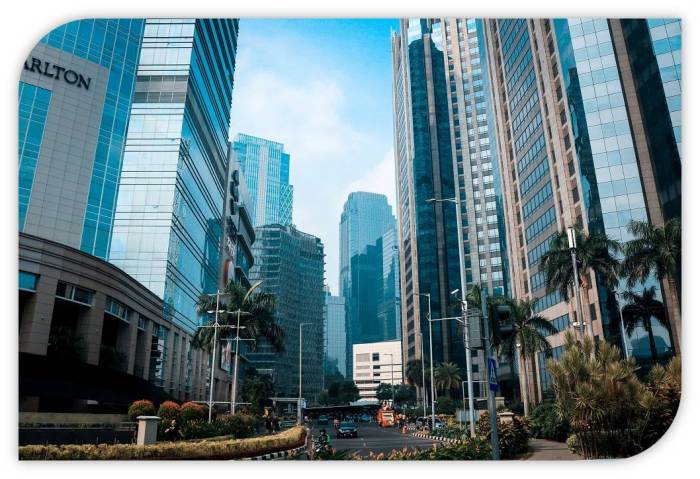
Source: businesshotels.com
The business travel sector contributes significantly to environmental impact, from carbon emissions from flights and transportation to the resource consumption of hotels themselves. Increasingly, however, both travelers and corporations are demanding more sustainable options, recognizing the ethical and economic benefits of environmentally and socially responsible practices. For business hotels, embracing sustainability is no longer a “nice-to-have” but a necessity for attracting and retaining clientele, enhancing brand reputation, and contributing to a healthier planet.The importance of sustainable practices within the business hotel industry is multifaceted.
It directly impacts a hotel’s bottom line through reduced operational costs (lower energy and water bills, waste management savings), improved brand image and customer loyalty, and enhanced employee morale. Furthermore, it aligns with growing consumer expectations for responsible business practices and helps to mitigate the negative environmental impacts associated with the hospitality sector. Finally, strong CSR initiatives contribute to a positive community impact, fostering a sense of social responsibility and strengthening relationships with local stakeholders.
Eco-Friendly Initiatives in Business Hotels
Many business hotels are proactively implementing various eco-friendly initiatives. These range from simple, cost-effective measures to more substantial investments in sustainable infrastructure. Effective implementation requires a holistic approach, integrating sustainability into all aspects of hotel operations.
Examples of Sustainable Business Hotel Practices
- Energy Efficiency: Implementing smart building management systems to optimize energy use, utilizing LED lighting, investing in renewable energy sources (solar panels, wind power), and encouraging guests to participate in energy-saving programs (e.g., reusing towels).
- Water Conservation: Installing low-flow showerheads and faucets, implementing water-efficient landscaping, utilizing rainwater harvesting systems, and educating guests on water conservation practices.
- Waste Reduction and Recycling: Implementing comprehensive recycling programs, reducing single-use plastics (e.g., eliminating plastic water bottles, providing reusable amenities), composting food waste, and partnering with local recycling facilities.
- Sustainable Sourcing: Procuring locally sourced food and beverages to reduce transportation emissions, choosing sustainable and ethically produced linens and toiletries, and prioritizing materials with recycled content in construction and renovations.
- Carbon Offset Programs: Investing in carbon offset projects to neutralize the hotel’s carbon footprint, often through partnerships with environmental organizations.
A Sustainable Business Hotel Profile: The “Green Gateway” Hotel
The Green Gateway Hotel exemplifies a commitment to sustainability and corporate social responsibility. Located in a vibrant city center with easy access to public transportation, the hotel boasts a LEED Gold certification, reflecting its commitment to environmentally sound design and construction. The hotel features solar panels on its roof, providing a significant portion of its energy needs. Low-flow fixtures and water-efficient landscaping minimize water consumption.
A comprehensive recycling program diverts a large percentage of waste from landfills, and the hotel actively sources food from local farms, reducing its carbon footprint and supporting the local economy. Furthermore, the hotel actively participates in community initiatives, partnering with local charities and offering employee volunteer programs. The Green Gateway Hotel demonstrates that sustainability and profitability can coexist, attracting environmentally conscious business travelers while also showcasing best practices for the industry.
Competitive Landscape of Business Hotels
The business hotel sector is fiercely competitive, with numerous brands vying for the attention of corporate travelers and event organizers. Success hinges on a compelling value proposition that resonates with the target audience and effectively differentiates the hotel from its competitors. This requires a keen understanding of market dynamics and the strengths and weaknesses of rival establishments.The competitive landscape is shaped by a complex interplay of factors.
These include brand recognition and loyalty programs, location and accessibility, pricing strategies, the quality and range of amenities and services offered, the effectiveness of marketing and branding campaigns, and the adoption of technological innovations. Sustainability initiatives and corporate social responsibility also play an increasingly important role in attracting environmentally and socially conscious business travelers.
Comparison of Business Hotel Brands and Their Unique Selling Propositions
Different business hotel brands cater to varying needs and preferences within the corporate travel market. For instance, Marriott’s portfolio includes brands like Courtyard by Marriott (targeting the budget-conscious business traveler) and JW Marriott (catering to luxury travelers). Hilton offers similar tiered options, from Hampton Inn (value-oriented) to Conrad Hotels & Resorts (luxury). Each brand leverages its unique selling proposition (USP) to attract its target market.
Courtyard emphasizes efficiency and affordability, while JW Marriott focuses on opulent amenities and exceptional service. Hyatt’s brands, such as Hyatt Regency and Hyatt Place, also occupy different segments of the market, offering varying levels of luxury and service. These brands differentiate themselves through design aesthetics, loyalty programs, technology integration, and specific service offerings tailored to business travelers’ needs.
Key Factors Influencing Competition in the Business Hotel Market
Several key factors influence competition within the business hotel market. These include:
- Pricing and Revenue Management: Hotels constantly adjust pricing based on demand, seasonality, and competitor pricing. Effective revenue management strategies are crucial for maximizing occupancy and profitability.
- Location and Accessibility: Proximity to business districts, airports, and transportation hubs is a critical competitive advantage. Hotels in prime locations command higher prices and attract more business.
- Amenities and Services: The range and quality of amenities—such as meeting rooms, business centers, high-speed internet, fitness facilities, and restaurants—directly impact a hotel’s attractiveness to business travelers.
- Brand Reputation and Loyalty Programs: Strong brand recognition and well-structured loyalty programs enhance customer retention and attract new business.
- Technology and Innovation: Hotels that embrace technology, offering features such as mobile check-in, keyless entry, and personalized in-room experiences, gain a competitive edge.
- Sustainability and CSR: Increasingly, business travelers prioritize hotels that demonstrate a commitment to environmental sustainability and social responsibility.
Competitive Landscape of Business Hotels in New York City
New York City, a major global business hub, exemplifies the intense competition within the business hotel market. Many international and domestic brands operate in the city, each vying for market share.
- The Peninsula New York: Known for its luxurious accommodations, impeccable service, and prime location.
- The Four Seasons Hotel New York Downtown: Offers a blend of luxury, modern amenities, and stunning city views.
- The Ritz-Carlton New York, Central Park: Renowned for its elegant ambiance, personalized service, and proximity to Central Park.
- Marriott Marquis New York: A large convention hotel with extensive meeting facilities and a central location.
- Hyatt Grand Central New York: Conveniently located near Grand Central Terminal, offering business-friendly amenities and easy access to transportation.
Wrap-Up

Source: nishathotels.com
The business hotel industry is a dynamic and competitive landscape, constantly evolving to meet the changing needs of its clientele. From strategic location choices and cutting-edge amenities to sustainable practices and effective marketing, success hinges on a multifaceted approach. By understanding the nuances of target audiences, leveraging technology, and prioritizing guest satisfaction, business hotels can thrive and continue to provide essential accommodations for the modern business traveler.
This guide has hopefully provided a robust framework for understanding this complex and fascinating sector.
Essential FAQs
What is the average price range for a business hotel?
The price varies greatly depending on location, amenities, and brand. Expect a wide range, from budget-friendly options to luxury accommodations.
Do business hotels offer airport shuttle services?
Many business hotels, especially those near major airports, provide complimentary or paid shuttle services. It’s always best to check with the hotel directly.
Are pets allowed in business hotels?
Pet policies vary widely. Some business hotels welcome pets with additional fees, while others have strict no-pet policies. Always confirm the hotel’s pet policy before booking.
What are some common loyalty programs offered by business hotels?
Many major hotel chains offer loyalty programs with benefits like points accumulation, room upgrades, and early check-in/late check-out options. Check individual hotel websites for details.
How can I ensure a quiet room when booking a business hotel?
When booking, specify your preference for a quiet room, away from elevators or busy areas. Many hotels will make every effort to accommodate your request.



